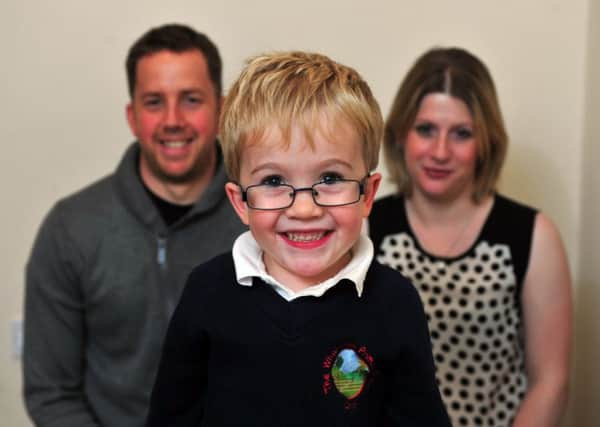Leeds mum's fears over future of son's pioneering treatment


Katy Brown, from Otley, tirelessly campaigned for her son, Sam, now eight - who has life-limiting Morquio Syndrome - to receive Vimizim, a drug which health regulator NICE finally agreed to fund in 2015 for five years.
But new rules - which came into effect on April 1 - have thrown its future use beyond that into doubt after NICE announced a cap on the cost of new medicines.
Advertisement
Hide AdAdvertisement
Hide AdDue to the inherent high cost of drugs for ultra-rare diseases, Mrs Brown, from Otley, said this decision “directly discriminates” against patients such as her son and branded it a “mis-guided, cost cutting exercise that will permanently damage lives”. She told the Yorkshire Post her “heart sank” when she heard the news.
“We have gone back to exactly where we started. I just couldn’t believe it,” she said.
The new rules involve the introduction of a £300,000 quality-adjusted life year (QALY) threshold for medicines evaluated through NICE’s Highly Specialised Technologies (HST) programme for very rare conditions.
QALYs are a generic measurement of disease burden which NICE use to gauge drug effectiveness in terms of how much it would cost to give a year of healthy life.
Advertisement
Hide AdAdvertisement
Hide AdCampaigners say many treatments for ultra-rare conditions currently funded by NHS England have costs per QALY of well over £300,000 - including Vimizim.
Morquio Syndrome is a degenerative condition which limits growth and mobility and shortens life expectancy to an average of 25 years. There is no known cure but patients say Vimizim - an enzyme replacement therapy - improves lives by allowing children to grow, as well as improve stamina, the ability to walk and pain levels. In a letter to NICE chief executive Andrew Dillon, Mrs Brown described the new rules as “like a cruel and depressing version of Groundhog Day”, writing: “Your consultation singles out people with the protected characteristic of disability, and directly stops their access to new treatments for no other reason than the condition that they were unfortunate enough to be born with is ultra rare.”
The MPS Society, which represents Morquio patients and others with rare inherited metabolic dieases, said the decision means the children and young adults “will be condemned to death”.
Chairman Paul Moody said it confirms that “children and young adults with ultra-rare diseases going forward are economic pawns in a failing NHS and cheaper dead than alive”.
Advertisement
Hide AdAdvertisement
Hide AdMrs Brown and the MPS Society are calling people to sign a petition urging NICE and NHS England to pause and reconsider the decision.
View the petition at http://www.mpssociety.org.uk.
A NICE spokesperson said: “Drugs for very rare diseases will be evaluated against a sliding scale, so the more additional QALYs a medicine offers - that is, the more therapeutic benefit a drug offers a patient when compared to current standard treatment - the more generous the cost per QALY level it will need to meet, starting at £100,000 per QALY, rising to a maximum of £300,000 per QALY. This is ten times higher than the normal limit applied by NICE.”